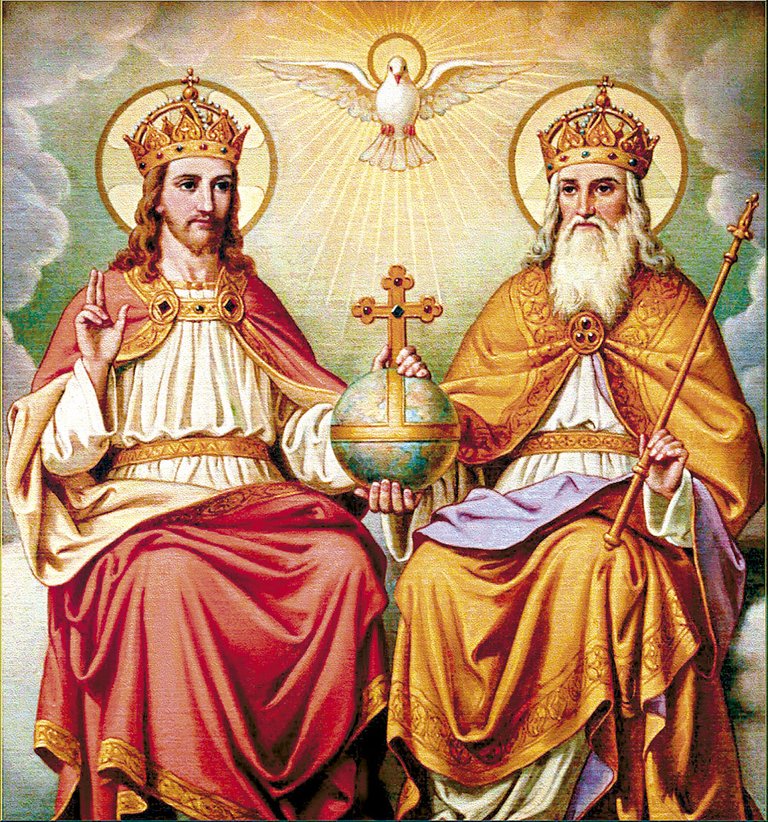Grace and peace be to you, from God our Father and the Lord Jesus Christ.
The following questions focus on fundamental aspects about God and his divine plan of salvation for all mankind. The answers to them contain an educational value that guides us to the knowledge of the nature of God and his purpose for man. I invite you to reflect and if possible give your personal and biblical comments about the questions that are presented.
1. How is God?
In (Acts 17: 22-23) we find: "22 Then Paul, standing in the middle of the Aereopagus, said: Athenian males, in all I observe that you are very religious; 23 For passing by and looking at your sanctuaries, I also found an altar on which was inscribed: TO THE UNKNOWN GOD. Whom you worship, then, without knowing him, it is he whom I announce to you. "

Source
Theologians have tried to describe God in many ways. God is the substance of all human virtues. It is all wisdom and everything knows it. It can do everything that we can not, and it is the repository of all the benefits to which we aspire. In other words, God is omnipotent (he can do everything), omniscient (he knows everything) and omnipresent (everywhere).
On the other hand, we can describe God by comparing it with our human limitations. For example, we are mortal, but God is immortal; We are fallible, but He is infallible. God is eternal and imperishable spirit. It has no beginning or end. He is fully aware of himself (I am). It is fully moral and responsible (Let's do). It is the essence of love and loves. He is also a straight judge (totally fair and faithful). God is the father of creation, the maker of all that exists. It is all-powerful and sustains the universe. It exists outside the universe (theologians call this transcendence), although its presence fills the whole creation (the theologians say it is immanent), and governs it.
It exists within nature, but it is not nature, nor is it subject to its laws as the pantheists say. It is the source of life and everything that exists.
The best description of God is the name that he revealed to the first Israelites, Jehovah.
Jehovah is sometimes translated as "Lord." The specialists believe that it is an old Hebrew verb form "to be", whose literal meaning would be: That thanks to which there exists (everything) what is.
2. What does the Bible say about the Trinity?
In 2 Corinthians 13:14 the apostle Paul says: "The grace of the Lord Jesus Christ, the love of God and the communion of the Holy Spirit be with you all. Amen.
The trinity is one of the great theological mysteries. Some think that because we are monotheistic and believe in one God, we can not accept the concept of the trinity. But, the Bible teaches that the divinity consists of three persons: the Father, the Son and the Holy Spirit, each of them fully God and full manifestation of the divine nature (Lk 3: 21-22).

Source
The father is the central person of the trinity, the creator, the first cause, the original idea, the concept of everything that has been and will be created. Jesus said: "My father works until now, and I work" (Jn 5:17).
The Son is the "Logos" or expression of God, the "Only Begotten" of the Father, He Himself is God. Even more, as God incarnate reveals us to the Father (Jn 14: 9). The Son of God is both the agent of creation and the only redeemer of humanity.
The Holy Spirit, the third person of the trinity, comes from the Father and is worshiped and glorified together with the Father and the Son. He inspired the Scriptures, poured out his power over the people of God, and "convicts the world of sin, of righteousness and of judgment" (Jn 16: 8).
The three persons of the Godhead are eternal. The Father exists and has existed since eternity. With Him there always existed his expression, the Son. The Father always loved the Son and the Son loved and served the Father. In this relationship of love is the Spirit of God. Who has existed since eternity. It is not that the Father existed first, the Son later and finally the Spirit. The three have always been, before anything else; three different people in one God. On the occasion of Jesus' baptism, the three persons of the Trinity were present and active. The Father spoke from heaven, the Son fulfilled all righteousness, and the Spirit descended on the Son like a dove (Mt 3: 16-17).
The Trinity is a mystery that will one day be clearly understood. For now, we know that the Bible talks about it and Jesus reveals it; The Christian church from the beginning has confessed and safeguarded this precious truth (1Co 12,4-6; 2Co 13.14; Eph 4,4-6; 2Ts 2, 13-14).
3. What should I do to be saved?
In (John 3: 3) we find: "Jesus answered and said unto him, Verily, verily, I say unto you, Except a man be born again, he can not see the kingdom of God."
To be saved you must turn your back on sin, believe in the death and resurrection of Jesus, and receive him as Lord and Savior of your life.

Source
Step by step, try to follow the following process:
First, you must reflect on your life and then abandon everything that contradicts the will of God. This move away from selfish attitudes and surrender to God is called repentance (Mt 3: 7-10, Acts 3:19).
Second, you must recognize that Jesus died on the cross to forgive your sins. Accept him as a savior to cleanse you from sin, as the substitute who paid for your sins (Rom 5: 9-10, Titus 2:14).
Third, you must ask him to become the Lord of your life, recognizing openly and publicly that Jesus is not only your Savior, but your Lord (1 Jn 2:23).
The Bible says that to all who received him he gave power to become children of God (Jn 1:12). A yes, when you receive and open your heart, it is introduced into him, into your inner being, through the Holy Spirit, and begins to live in you.
From that moment it is your privilege and call to confess what God has done for your life (Rom. 10: 9).
4. If I sin, will I lose my salvation? (Heb 6:4-6)
An act of sin does not cost you your salvation. Some people say that if you sin after accepting Jesus you must be saved again. But this is not what the Bible teaches.
Can you imagine that someone adopts a child and then throws him onto the street because he makes a mistake when he is learning to walk? When we are saved, we are adopted as members of the family of God. We must, full of love, on the one hand, and of holy fear, on the other, live lives that please him. But the idea that a sinful act can cause someone to be expelled from the family of God is not in the Bible (1 Jn 1: 7-9). However, sins and rebellions will take away the joy of salvation. When David sinned he did not feel joyful, because he had rebelled against God (Ps 51:12). His words at the time were: "And do not take my Holy Spirit from me" (Ps 51:11). Even though he had committed adultery and was responsible for the death of an innocent, this phrase reveals that he still possessed the Holy Spirit. Although he was punished for his sin. God forgave him and loved him when he repented before the Lord.
If one perseveres in sin, one can lose the security of salvation, but that does not amount to an actual loss of it. When the Scripture says: "We know that everyone who is born of God, does not practice sin," the meaning of the phrase in Greek is not that the Christian never commits sin, but does not persevere in it, refusing to confess and repent. A person born of the Spirit of God will be led to repentance every time he sins.

Source
Furthermore, we read in (Hebrews 10:29) that if someone despises the blood of Christ and renounces the salvation he has received, then that person may have lost it altogether. But the same book says: "But as for you, beloved, we are persuaded of better things" (Heb 6: 9). It is very difficult to believe that someone who has been born again is so separated from God.
But we can ask ourselves: if we are a new creature in Christ, why do we preserve the ability to sin after the new birth? The answer is that Christian perfection waits for us in heaven (1 Cor 15:54). Thus, we are united to Jesus in salvation, but we are transformed in his image and likeness progressively (2 Cor 3:18). Our lives are gradually transformed, but at no time before death does the believer reach perfection (1 Jn 1: 8).
"And because evil has multiplied, the love of many will grow cold. But whoever perseveres to the end, he will be saved "(Matthew 24: 12-13).
In the debate about the time of the Rapture, one point is usually neglected. And that is that the terms and conditions of salvation during the great tribulation are totally different from the terms during the Church Age, and, therefore, they are not meant to be for the same group of people. In both cases salvation is by faith alone, but that is where any similarity ends. This presents another argument in favor of the Church Age believers that are taken before the great tribulation begins.
Here is the heart of the matter about the nature of salvation during the Church Age. Ephesians 1: 13-14 says, "In him you also, having heard the word of truth, the gospel of your salvation, and having believed in it, you were sealed with the Holy Spirit of promise, which is the earnest ] of our inheritance until the redemption of the acquired possession, to the praise of his glory ".
Amen. Biblical argument that reinforces the solidity of the knowledge of salvation. God bless your life more.
Congratulations! This post has been upvoted from the communal account, @minnowsupport, by elpastor from the Minnow Support Project. It's a witness project run by aggroed, ausbitbank, teamsteem, theprophet0, someguy123, neoxian, followbtcnews, and netuoso. The goal is to help Steemit grow by supporting Minnows. Please find us at the Peace, Abundance, and Liberty Network (PALnet) Discord Channel. It's a completely public and open space to all members of the Steemit community who voluntarily choose to be there.
If you would like to delegate to the Minnow Support Project you can do so by clicking on the following links: 50SP, 100SP, 250SP, 500SP, 1000SP, 5000SP.
Be sure to leave at least 50SP undelegated on your account.